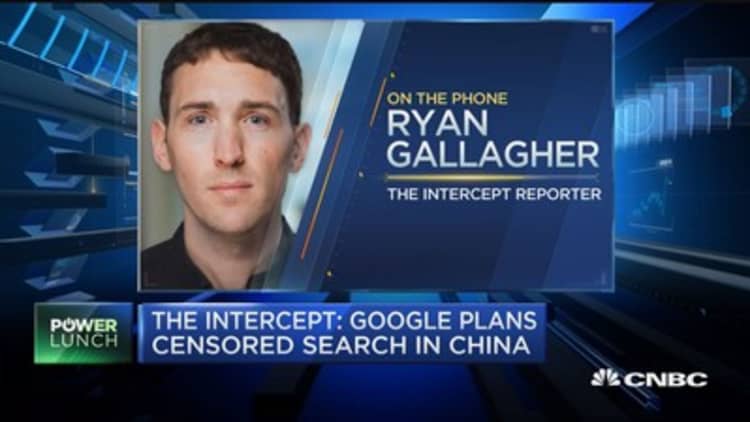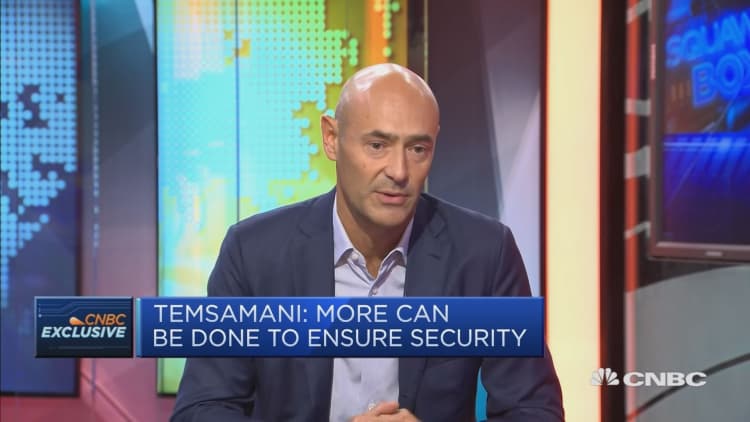Last January, Alphabet's X "moonshot" factory announced a surprising turn, a new cybersecurity company called Chronicle. The press statement was short on details, and since then, Chronicle has been silent about what it's working on.
Chronicle is one of Alphabet's newest "Other Bets," the group of Google's sister companies that are hoping to stumble on the next big thing in tech, such as self-driving cars (Waymo) or high-speed internet access in remote areas (Loon). And cybersecurity is a potentially massive opportunity for Alphabet. Research firm Gartner predicts cybersecurity spending will hit $96 billion in 2018, and only increase from there.
Now, Chronicle CEO Stephen Gillett is revealing some initial details about where his mysterious Other Bet is going. Here's what he told CNBC.
Chronicle is getting closer to going public with its cybersecurity platform, but hasn't set a date, said Gillett, a veteran technology executive who joined Chronicle directly from his work at X. But some outsiders have viewed the planned Chronicle product, he said, including executives at other security companies.
Gillett said that just before the January launch, he called chief executives from around 30 top cybersecurity firms to reassure them that the technology giant's latest company wasn't formed to compete with them.
"In order to disarm their concern, I offered them and their CTOs access to our platform," he told CNBC on Thursday. "We have such incredible scale, what we are doing … it's nothing that they would even attempt to do."
Since those conversations, Chronicle has been alpha testing its products at a range of companies, including Fortune 50 giants, smaller firms and those spanning industries including health care, government, finance, retail and others. Just this week, the Chronicle team moved into its permanent home, a new building in Mountain View, California, next to Alphabet's headquarters.
What is Chronicle?
Gillett said Chronicle will provide "planet-scale" security analytics, combining Google's existing artificial intelligence, machine learning, infrastructure and "near limitless compute" capabilities.
That sounds a little like the monitoring and intelligence services offered by security giants like Symantec – where Gillett was chief operating officer from 2011 to 2015 – FireEye or McAfee. But Gillett said Chronicle's vision is bigger and meant to augment, not replace, other security offerings already in the marketplace.
For instance, Chronicle will not offer "endpoint monitoring," a common security product that monitors devices in an enterprise and alerts security professionals when something goes wrong at the hardware level. Instead, Chronicle will focus on allowing organizations "to make sense of the information that is flowing across their environments in a way that is very, very cost effective," he said.
Despite still existing in a pseudo-stealth mode, there are several clues on what Chronicle's products will look like, including past X projects, some of the companies that have moved under Chronicle and what it hopes to accomplish.
First, the product will undoubtedly cover a wide swatch of the cybersecurity sector. Alphabet's Other Bets are expected to deliver a product "ten times the impact" than what already exists.
"For us, and I personally, there is probably no bigger threat to humanity than not getting the cybersecurity threat right," said Gillett.
Second, a large-scale advantage for the company is VirusTotal, a product owned by Google that was moved under Chronicle's corporate umbrella earlier this year. VirusTotal is a web-based application that analyzes incoming potential threats in the form of website URLs and file attachments. It's free to use, and is ubiquitous among security professionals, large corporations, anti-virus companies and government agencies.

VirusTotal records malware signatures and hallmarks of malicious activity, and gives security professionals the ability to vote on how harmful the content may be. The product was first launched in 2004, and Google bought it in 2012.
VirusTotal offers a valuable cache of 14 years of peer-reviewed intelligence on viruses, worms, malware and other threats. Data like this is necessary to provide meaningful thrust behind artificial intelligence or machine learning products, and it's hard to find it all in one place in the security industry.
Another top issue Chronicle is hoping to solve is the cybersecurity workforce crisis.
"Right now if you are a cybersecurity professional – and I don't mean somebody with a [technology] background, I mean really somebody who just knows something about cybersecurity – I think the unemployment rate is at zero percent right now," said Gillett. "We have a problem. There's just not enough people to go around."
Through Chronicle's alpha testing, Gillett said the company has found that many large organizations may have "only three or four people on security, and they might not have the right tools."
"We can work with an average security team and turn them into a great security team," he said.
Chronicle's tagline, "give good the advantage," in part refers to even out the playing field between large and small security teams, he said, with analytics that can help put supports in places where there may be a gap in personnel.
For now, we only have a broad idea of how Chronicle will tackle these problems. Gillett is keeping most details under wraps. But it's apparent Chronicle isn't thinking small.



